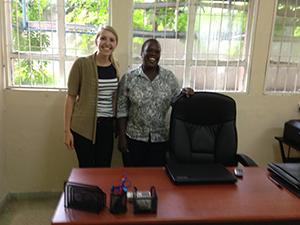By: Anne Zaczek, U.S. Grains Council Manager of Global Development Programs
With its large and rapidly growing populations and enormous resource base, sub-Saharan Africa is commanding renewed attention. While it doesn’t command the headlines garnered by the dramatic economic success stories in China, India, Brazil, and elsewhere, U.S. agricultural exports to sub-Saharan Africa have quietly increased by over 200 percent in the last decade. Bilateral agricultural trade between the region and the United States is now approaching $5 billion. At the same time, a new generation of leadership in several African countries shows promise of learning from the wrong turns of the post-independence era and charting a more successful course in the future.
I recently traveled to Nairobi, Kenya to attend the USDA’s Globally Based Initiative U.S.-East African Agricultural Trade Conference. While in Africa, I was also joined Cary Sifferath, U.S. Grains Council regional director for the Middle East and Africa, in opening the Council-directed Food for Progress Tanzania Program workplace in Dar es Salaam, Tanzania.
In Nairobi, I participated in a panel entitled “Livestock Feed Sector – Current Status of Industry, Key Products and Market Opportunities.” In the past, the conference had been solely focused on developments in the retail sector This year is the first in which it has hosted a break-out focused on livestock feed. It is encouraging that the Council was one of the international partners invited to make a presentation.
There was an excellent turnout of local end-users and considerable interest in the Council’s Food for Progress program from other nations in eastern Africa. I sense great potential to use our current program template and apply it to other countries in the region.
In neighboring Tanzania, the Food for Progress initiative will work toward sustainably enhancing the total capacity of the poultry production and feed milling industries. The aim is to increase feed quality and streamline understanding and cooperation among government officials, feed manufacturers and poultry producers. While the startup is being funded by the Food for Progress program, the goal is to build a self-sustaining institution maintained by local industry associations and government. The initial phase is planned and led by the Council through local staff and consultants.
The centerpiece of the project is the government feed quality laboratory. The timetable calls for the feed lab to be fully-functional at the end of four years, with proper equipment and trained staff, and institutional support from the Ministry of Livestock and Fisheries to ensure on-going access to utilities, equipment, materials and staff training.
Another piece of the puzzle is working with the Tanzania Poultry Breeders Association and Tanzania Feed Manufacturers Association to builds their capacity to work with the government and better serve their industry.
Food for Progress will also identify and nurture leaders; instill the vision and skills to make good business plans; build institutions; increase awareness of and commitment to industry cooperation; improve business practices; and advocate appropriate government polies and regulations to allow the poultry industry to flourish.


